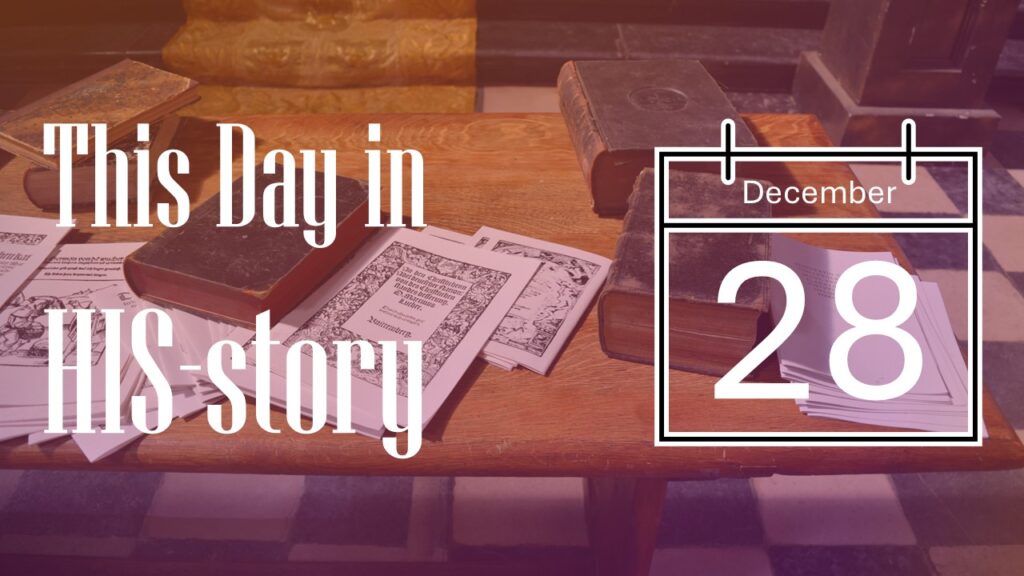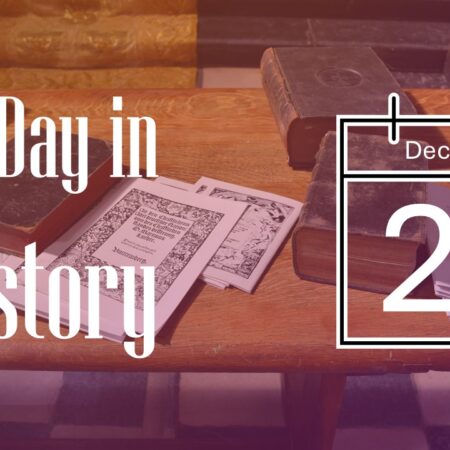
1737
HT: Christian History Institute
John Gill was converted to the Christian faith at twelve years of age; at nineteen he made a public confession of faith. Those who knew him assumed he would be a preacher because his nose was always in a book. Gill did indeed become a pastor, accepting a call to Horsleydown, a Particular Baptist church in London, where he would remain fifty-one years.

A strict Calvinist, he criticized John Wesley for teaching that people have a choice in their own salvation. Gill treated many other theological issues in depth, including the tendency of some church-goers to sin on the assumption that whatever the elect do is covered by Christ’s grace. Here is a paragraph from a sermon he preached on this day 28, December 1737, a Wednesday evening service under the Julian calendar that was still in use by England. Its Bible text was from 1 Timothy 6:3.
“The doctrine of particular redemption by Christ, is free from any imputation of libertinism. It is indeed a redemption from the bondage, curse, and condemnation of the law; but does not exempt from obedience to it, as it is in the hands of Christ; for saints are still under the law to Christ; (1 Corinthians 9:21) nor do any more delight in the law of God after the inward man, or more cheerfully serve it with their mind, than those who are most sensible, that they are become dead unto it, and delivered from it by the blood of Christ. Redemption is a deliverance from sin, from all sin, original and actual; and that not only from the guilt of sin, and the punishment due unto it: but in consequence of redeeming grace, the redeemed ones are delivered from the dominion and governing power of sin, and at last from the being of it. Christ saves his people from their sins; he does not indulge them in them; the deliverer that comes out of Zion, turns away ungodliness from Jacob. Strange! that a redemption from a vain conversation should ever be an encouragement to one; or that a person’s being ransomed out of the hands of Satan, and taken as a prey out of the hands of the mighty, should he an argument with him to give up himself to him and his service; or can he thought to have any tendency to engage him in a state of bondage to him, to be led as a captive by him at his will. Besides, the great end of Christ’s giving himself for any of the sons of men, is, that he might redeem them from all iniquity, and purify unto himself a peculiar people, zealous of good works. (Titus 2:14) Nor does anything lay such an obligation upon men to glorify God with their body and spirit, as the consideration of this, that they are not their own, but are bought with a price, (1 Corinthians 6:19, 20) even with the precious blood of Christ; nor can any thing like the love of Christ, the redeeming love of Christ, constrain men to obedience, to live not unto themselves, but unto him which died for them, and rose again. (2 Corinthians 5:14, 15)”
1800
“KRISHNA, you have left off all the customs of your ancestors—what is the reason?”
Krishna Pal replied, “I tried the Hindu worship, but got no good.” By his own testimony he had performed all of Hinduism’s required works, such as worshiping idols, bathing in the Ganges, licking the dust of his guru’s feet, visiting holy places, giving property to priests, repeating the name of his guardian deity, and meditating on and singing Hindu verses. None of this had relieved his sins: “After a while I heard of Christ—that he was incarnate, labored much, and at last laid down his life for sinners. I thought, what love is this! And here I made my resting place.”

The story behind Pal’s faith began when he heard the gospel proclaimed, first in a street and then from Moravian missionaries for whom he did carpentry work. Injuring an arm, he went to the Baptist mission in Calcutta to have it treated. The doctor set the dislocated bone and told Pal of a far more serious condition—sin. Pal wept and believed. A month later, on this day, 28 December 1800, Baptist missionary William Carey baptized him in the Ganges. The ceremony was conducted in the Bengali language before many curious onlookers. Carey advised the crowd that the baptism was not effective because the river was considered sacred, but because Christ took away sins. Carey and his associates had labored seven years for such a conversion. William Ward, one of them, wrote in his Journal, “Blessed Day!”
Afterward, Pal, a Brahmin, gave up his high caste to eat with the missionaries. Immediately he suffered persecution for throwing off his traditional rank. Afterward he would often be accosted on the topic: “Brother, you speak good words, and have much wisdom; but why have you thrown away your caste?”
Pal would reply, “The man who keeps his caste cannot obtain salvation. Men who have their caste are very proud, and he who is proud cannot enter into the kingdom of God.”
Burdened for souls, he soon began to preach. He poured himself into gospel work, preaching from one edge of India to another. During five years he was assigned to work in Calcutta he preached, on an average, twelve or fourteen times every week. He built a church there out of his own funds. He also wrote several hymns, including this one:
O thou, my soul, forget no more the Friend Who all thy misery bore;
Let every idol be forgot, but, O my soul, forget Him not. . . .
Renounce thy works and ways, with grief, and fly to this most sure relief;
Nor Him forget, who left His throne, and for thy life gave up His own.
His death when it came in 1822 was from cholera. Unlike many of his Indian contemporaries, who died in terror, he died at peace, rejoicing in Christ.
